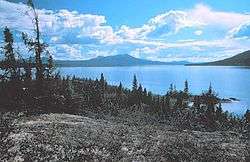Walker Lake (Northwest Arctic, Alaska)
Walker Lake is the source of the Kobuk River in northwestern Alaska (emptying into Kotzebue Sound). The lake is located near the easternmost part of Northwest Arctic Borough, deep in the remote interior of northern Alaska. Explored during an expedition led by John C. Cantwell in 1885, under the authority of the Revenue Marine. Also known as "Big Fish Lake", Inupiaq legend in the area told of giant, ferocious fish that inhabited the waters. An attempt by a native with the Cantwell expedition to catch one of these giant fish involved a hook made of an entire set of reindeer antlers baited with a whole goose.
| Walker Lake | |
|---|---|
 | |
| Location | Northwest Arctic Borough, Alaska, United States |
| Coordinates | 67°07′36″N 154°21′47″W[1] |
| Primary outflows | Kobuk River |
| Basin countries | United States |
| Surface elevation | 679 feet (207 m)[1] |
| Designated | 1968 |
In 1968, Walker Lake, was designated as a National Natural Landmark by the National Park Service.[2]
References
- "Walker Lake". Geographic Names Information System. United States Geological Survey. Retrieved 2009-05-04.
- "National Natural Landmarks - National Natural Landmarks (U.S. National Park Service)". www.nps.gov. Retrieved 2019-03-20.
Further reading
- Sherwood, M. (1965). Exploration of Alaska: 1865–1900. New Haven and London: Yale University Press.
This article is issued from Wikipedia. The text is licensed under Creative Commons - Attribution - Sharealike. Additional terms may apply for the media files.